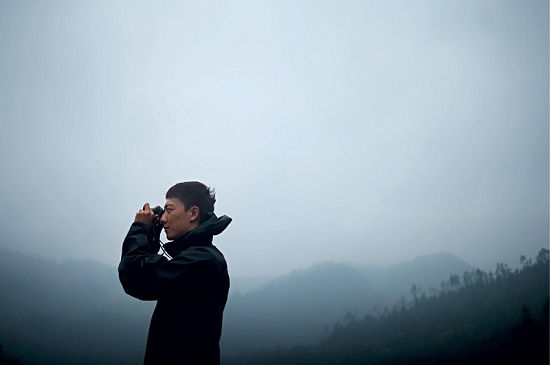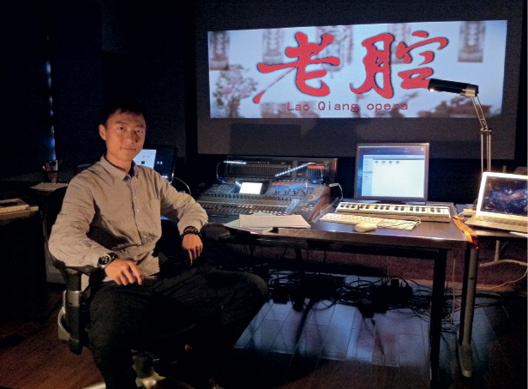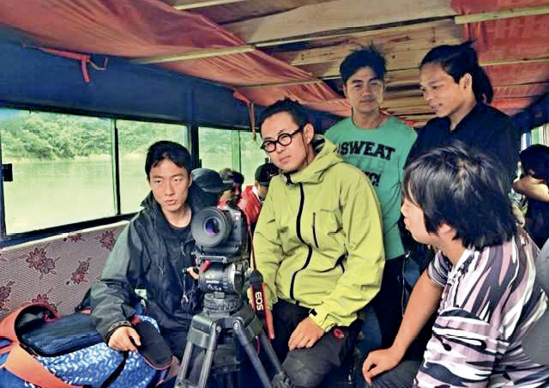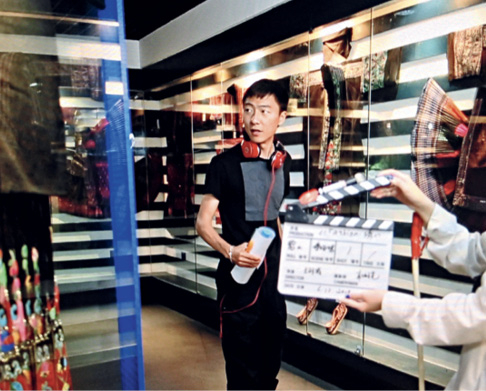A versatile filmmaker who has been dedicated to directing a wide range of short films.

Wang Yucheng is looking at the mountains through monocular during his film shooting in Guizhou Province in 2013.
At the Shanghai International Advertising Festival (SHIAF) 2021 held in July 2021, director Wang Yucheng was the recipient of three shining trophies. Behind the scenes, he is a low-key person who is dedicated to creating advertisements and short films. He has won the nickname “chameleon director” for his passion of finding ways to exhibit a different style in each video, so as to make the artwork fit the theme and impress every audience.

Wang Yucheng at the film editing studio in 2009.
Finding Cultural Memories in His Hometown
Wang was born in the famous historical city of Xi’an in Shaanxi Province. Growing up in a city that was the capital of several ancient dynasties, he was influenced by traditional Chinese painting, stone carving, ceramics, and other antique forms of art, which inspired within him an ambition of studying in Xi’an Academy of Fine Arts. As his family did not support his desire of pursuing an art career, he entered Xi’an University of Science and Technology to study an English major. During his university studies, he never forgot his dream of engaging in art. Later, after unremitting efforts, he was admitted into the Department of Directing of Beijing Film Academy in 2005, officially entering the door to a career in the field of art.
Lao Qiang Opera is the first micro-film which Wang directed. This ancient form of opera has a long and wide spread history in eastern Shaanxi’s Huayin City. It is often performed in shadow plays in the region. Wang discovered that those loud and simple old songs were hardly heard anymore. As he was approaching graduation in 2009, he decided to make a film about the culture of his hometown. “At that time, I felt that this kind of opera was on the verge of extinction. As an artist, I thought I must have a sense of cultural responsibility, and my production should reflect the reality,” Wang told China Today.
Later, Wang contacted Dang Anhua, former curator of the Huayin Cultural Center. He presented his shooting ideas, learned about the opera’s present situation, and visited senior artists. After collecting substantial material, he decided on the theme of the shooting and received strong support from the local center and other relevant departments. Since there were few films about the opera at that time, the senior artists lacked shooting experience. Wang explained his objective of shooting the film and the angles he wanted to shoot to each senior artist. The artists were also touched by his enthusiasm and cooperated with his shooting, sharing the common desire that this opera could be appreciated by more people and passed on to future generations.
In this micro-film, Wang created the plots based on his own experience and feelings. The narrative tells a story of two generations, depicting their different fates and feelings, and as a result the loss of the opera. Yao Ye, an abandoned baby portrayed in the film, is adopted by an elderly opera artist in a village. The grandpa teaches Yao the skills of the opera in the hopes that he would continue to perform for the villagers. However, Yao, being attracted by pop music and a more modern lifestyle, eventually leaves his hometown to find other career opportunities. With the passing of time, his living conditions begin to improve, but then the news that grandpa is dying brings Yao back home. After seeing the collection of his grandpa about the opera, Yao begins to sing the high-pitched opera again which echoes throughout Huayin’s Huashan Mountains. At the end of the film, it introduces the situation of the opera at that time in an attempt to lead the audience to ponder over the future of the art.
To promote the opera, Wang uploaded the micro-film to the Chinese video platform Youku, which received millions of hits in just a few days. Later, this film won the Golden Panda Award at the 10th Sichuan TV Festival, and was shortlisted for the 6th Golden Awards of the Beijing Film Academy.
At present, as a national intangible cultural heritage, this form of opera is effectively protected and developed. The Huayin Laoqiang Protection Center was established in 2009. It has gathered together many senior culture inheritors and regularly holds training courses about the art. It has also organized tours for cultural exchanges across China and the globe. “In my first short film, I chose a simple narrative to tell a story. I hope that my work can help change the present status of the opera. This is the happiest thing I can do as a visual artist and it also has deep significance,” Wang told China Today.

A shooting moment of Wang Yucheng (left) and his team on a boat in Guizhou Province in 2013.
Discovering a Secret Place
As a result of the positive feedback Wang received for Lao Qiang Opera, he was much encouraged to continue shooting short films after graduation. During his early years in Beijing, he experienced the hardships of life but honed his abilities in different shooting groups. In 2013, he founded his own studio and took the lead in pursuing a working mode of direct communication between directors and enterprises. It was at that time that a valuable opportunity presented itself to him.
Miao embroidery is a traditional skill passed down by the Miao ethnic group in China, and is widely spread in the areas of southwestern China’s Guizhou Province, home to large pockets of Miao people. It portrays rich and varied styles and reflects the wisdom of generations of Miao women. However, due to the remote location, waves of people left their homes to work in distant cities, and this traditional skill was once on the verge of extinction. In 2013, together with China Soong Ching Ling Foundation, Marie Claire China, famous hostess Li Jing, and designer Wang Peiyi, Wang and his team went to two villages in Guizhou Province to find the people who knew the skills of making Miao embroidery and to explore the Miao culture.
Since his partners chose to present the story of Miao embroidery in the form of a documentary, Wang, who had studied the style of story-telling, tried a bold exploration at that time. It was the first time he went to Guizhou to shoot a short documentary. Before the official shooting, he went to the village to collect materials in advance. After traveling the long journey by various means of transport including planes, buses, boats, and mountain climbing, Wang and his team finally arrived at the village surrounded by mountains and forests. In the smoke-filled traditional stilted buildings, the primitive and simple life of local residents reminded him of the scenes in the film The Seven Samurai directed by the well-known Japanese Akira Kurosawa.
The short documentary explores the Miao village from the first person narration of the hostess Li, displaying the Miao embroidery in the life of the Miao people. It presents a concept of sustainable development of the old skill by combining tradition with innovation. Wang’s camera team often shot videos far away from the Miao women in order to capture a flavor of their real life. “Because of the unpredicatable nature of the documentary-making process, I kept thinking about how to record it in a way that was accurate to real life. However, through the eyes of our team, the so-called faithful record was already reflected due to the insights of everyone involved in the creation. The beauty and soul of the Miao villages become what I wanted to be seen in this film,” said Wang as he reflected over his production.
The 10-minute film was well received when it was released. It was brought to the Paris Fashion Week 2014 for broadcast at a charitable exhibition. The film also won the annual award of the 2015 Canon China Professional Video Competition. Wang donated all the camera prizes he won from Canon to the China Soong Ching Ling Foundation to help local women record their embroidery techniques with images, so as to better pass on and develop their cultural heritages.
Today, the Miao people are utilizing an industrialized development mode to preserve Miao embroidery, cooperating with international brands like Hermes to launch handcrafted products, exhibitions, and other projects. “We have achieved win-win cooperation. My team and I have enabled more people to learn about this embroidery skill through the documentary, which at the same time also promotes the further development of the Miao people. This is the happiest moment for the creators,” Wang told China Today.

Wang Yucheng is directing a short documentary at an exhibition hall of Miao embroidery in 2013. Photos courtesy of Wang Yucheng
Exploring More
Wang has cooperated with many well-known brands, actors, and production teams at home and abroad, which in turn has helped him explore his potential in the course of exchanges.
In 2016, Wang’s team and Legendary Pictures co-produced the music video of the finale of the movie The Great Wall directed by famous Chinese director Zhang Yimou. Through the combination of Eastern, Western, traditional and modern music, the team presented a music feast bridging ancient and modern times.
In 2017, Wang’s team cooperated with the World Wide Fund for Nature to shoot an advertisement on banning the ivory trade. Through the documentary photos displayed in the exhibition, famous actress Li Bingbing told a story of the life of a little elephant, calling for prohibition of the ivory trade.
In 2018, Wang’s team released the first urban fashion micro-film in cooperation with Harper’s BAZAAR. With eight young actors in four short stories, it presents the confusion, apprehension, and persistence that define the life of many young people today.
In 2019, Wang took the lead in shooting an advertisement by combining animation special effects with shootings of real people. It is the first exploration of this type of video in China. His customer originally hoped to shoot a short film of a family enjoying happy moments together with children playing the piano. After learning about its corporate culture, mascot, and brand ambassador, Wang decided to use bionic technology to produce a computer graphics image of the brand mascot to accompany a child learning to play the piano. This bold move broke away from the general advertising norm of displaying a brand ambassador in the whole film, taking inspiration from a heartwarming advertisement launched by a foreign company every Christmas. The video also uses original background music. Within the tight deadline for completion, Wang’s team repeatedly communicated every detail with other production teams at home and abroad, shot a lot of material, and finally produced a creative and moving advertisement. As a result, it won the Merit Award of 2019 One Show Greater China Awards, the Silver Award and Best Director Award of Golden Lion Award in 2020, and three awards of SHIAF in 2021.
During his career of more than 10 years, Wang has always conveyed goodwill and beauty in creating different styles of films to record the changes of Chinese society. At present, Wang and his team are preparing a longer film that shows young people’s passion for love. All that is important to Wang, in his own words, is that “you just need to remember my film, all the great performances surpass their form.”